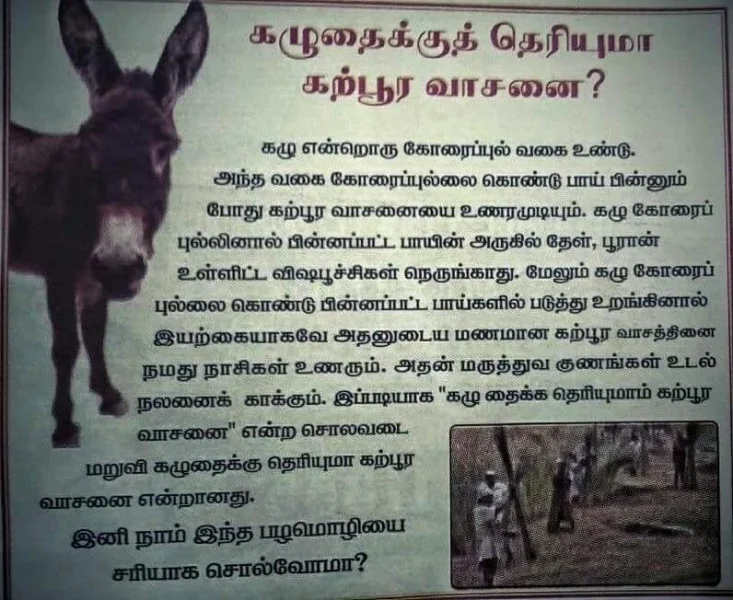P.J.
0
"கழுதைக்கு தெரியுமா கற்பூர வாசனை "
"கழுதைக்கு தெரியுமா கற்பூர வாசனை "
( You may have another explanation for this proverb, please share for the benefit of members
without criticizing what is given in OP; I have only gathered these from a site and sharing them here)
"கழுதைக்கு தெரியுமா கற்பூர வாசனை "நாம் தற்பொழுது இந்த பழமொழியின் உண்மை வடிவினை காண்போம்.சங்க காலத்தில் நம் முன்னோர்கள் படுக்க பாய் மட்டுமே பயன்படுத்தினார்கள்.
அந்த பாய் புல்லுகொண்டு தயாரிக்கப்பட்டதாகும். அந்த புல்லு கற்பூரபுல், கோரைப்புல் என இரு வகைப்படும். கோரைபுல்லுக்கு கழு என்று வேறு ஒருபெயர் உண்டு. கற்பூரபுல்லு கொண்டு தயாரிக்கப்படும் பாயில் கற்பூர வாசனை வரும். கற்பூர பாயின் விலை அதிகம் பெரிய செல்வந்தர்கள் தான் அதனை பயன்படுத்துவார்கள்.
கோரைபுல்லு கொண்டு தயாரிக்கப்படும் பாய் சாதாரணமாக இருக்கும்.இதன் விளையும் குறைவு பாமர மக்கள் பயன்பாட்டிற்கு உதவும். இதனை மனதில் வைத்து வந்த பழமொழிதான் "கழு தைக்க தெரியுமா கற்பூர வாசனை" கழுஎன்றகோரைபுல்லின் பெயருடன் தைக்க என்ற செயலும் இணைந்து 'கழுதைக்க, கழுதைக்க' என்று சொல்லி சொல்லி அவ்வார்த்தை மருவி 'கழுதைக்கு' என்று ஆகிவிட்டது.
அதன்உண்மையான அர்த்தம் "கழு என்ற கோரைபுல்லு கொண்டு செய்யப்படும் பாயில் எப்படி கற்பூர வாசனை வரும்?" என்பது தான்.அது தான் தற்பொழுது மருவி "கழுதைக்கு தெரியுமா கற்பூர வாசனை" என்று ஆகி விட்டது
Source:
http://thamira-nanbargalinkoodaram.blogspot.in/2011/11/blog-post_12.html
"கழுதைக்கு தெரியுமா கற்பூர வாசனை "
( You may have another explanation for this proverb, please share for the benefit of members
without criticizing what is given in OP; I have only gathered these from a site and sharing them here)
"கழுதைக்கு தெரியுமா கற்பூர வாசனை "நாம் தற்பொழுது இந்த பழமொழியின் உண்மை வடிவினை காண்போம்.சங்க காலத்தில் நம் முன்னோர்கள் படுக்க பாய் மட்டுமே பயன்படுத்தினார்கள்.
அந்த பாய் புல்லுகொண்டு தயாரிக்கப்பட்டதாகும். அந்த புல்லு கற்பூரபுல், கோரைப்புல் என இரு வகைப்படும். கோரைபுல்லுக்கு கழு என்று வேறு ஒருபெயர் உண்டு. கற்பூரபுல்லு கொண்டு தயாரிக்கப்படும் பாயில் கற்பூர வாசனை வரும். கற்பூர பாயின் விலை அதிகம் பெரிய செல்வந்தர்கள் தான் அதனை பயன்படுத்துவார்கள்.
கோரைபுல்லு கொண்டு தயாரிக்கப்படும் பாய் சாதாரணமாக இருக்கும்.இதன் விளையும் குறைவு பாமர மக்கள் பயன்பாட்டிற்கு உதவும். இதனை மனதில் வைத்து வந்த பழமொழிதான் "கழு தைக்க தெரியுமா கற்பூர வாசனை" கழுஎன்றகோரைபுல்லின் பெயருடன் தைக்க என்ற செயலும் இணைந்து 'கழுதைக்க, கழுதைக்க' என்று சொல்லி சொல்லி அவ்வார்த்தை மருவி 'கழுதைக்கு' என்று ஆகிவிட்டது.
அதன்உண்மையான அர்த்தம் "கழு என்ற கோரைபுல்லு கொண்டு செய்யப்படும் பாயில் எப்படி கற்பூர வாசனை வரும்?" என்பது தான்.அது தான் தற்பொழுது மருவி "கழுதைக்கு தெரியுமா கற்பூர வாசனை" என்று ஆகி விட்டது
Source:
http://thamira-nanbargalinkoodaram.blogspot.in/2011/11/blog-post_12.html
Attachments
Last edited:


